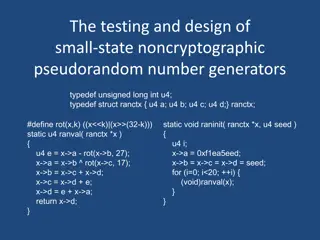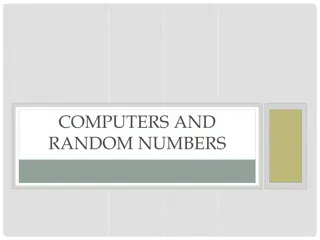Cryptographic Reductions and Learning in Computational Complexity
This lecture explores the connection between computational complexity and cryptography, focusing on topics like pseudorandom functions, public-key cryptography, and learning from Gaussians. It delves into the implications of cryptographic reductions, lower bounds for learning MLPs, and the existence
0 views • 22 slides
Understanding Small-State Noncryptographic Pseudorandom Number Generators
Explore the design and testing of small-state noncryptographic pseudorandom number generators, including definitions, rules of thumb, chisquare tests, existing and new generators, and more. Learn about block cipher encryption, hash functions, pseudorandom number generation, reversible mixing, and re
0 views • 46 slides
Understanding Random Numbers in Computers
Explore the concept of true random numbers versus pseudorandom numbers in computers. Learn how pseudorandom numbers are generated algorithmically but predictable, while true random numbers are derived from physical phenomena like radioactive decay. Discover the relevance of high-entropy pseudorandom
0 views • 57 slides


